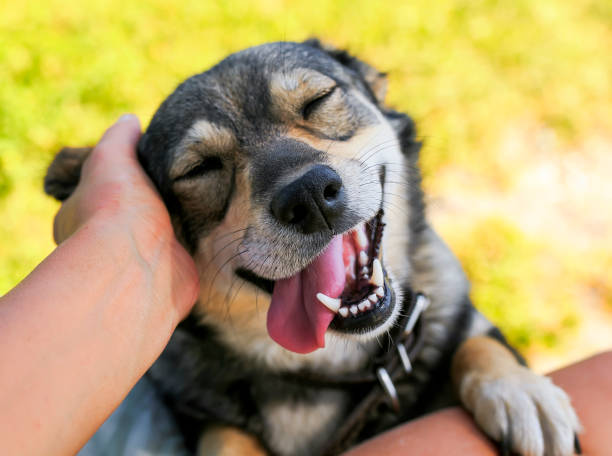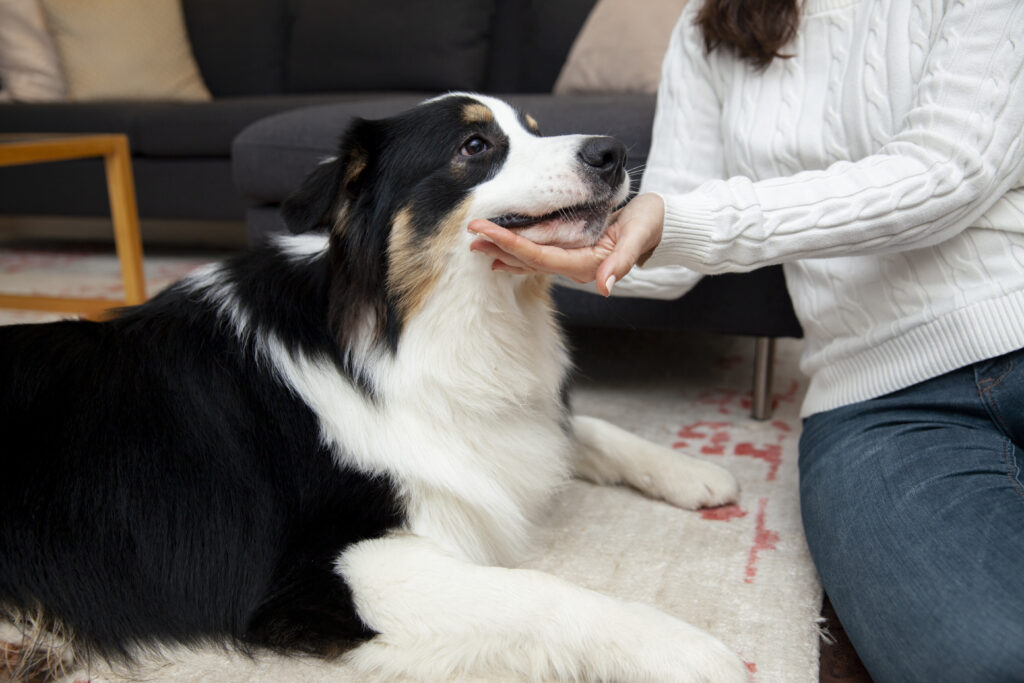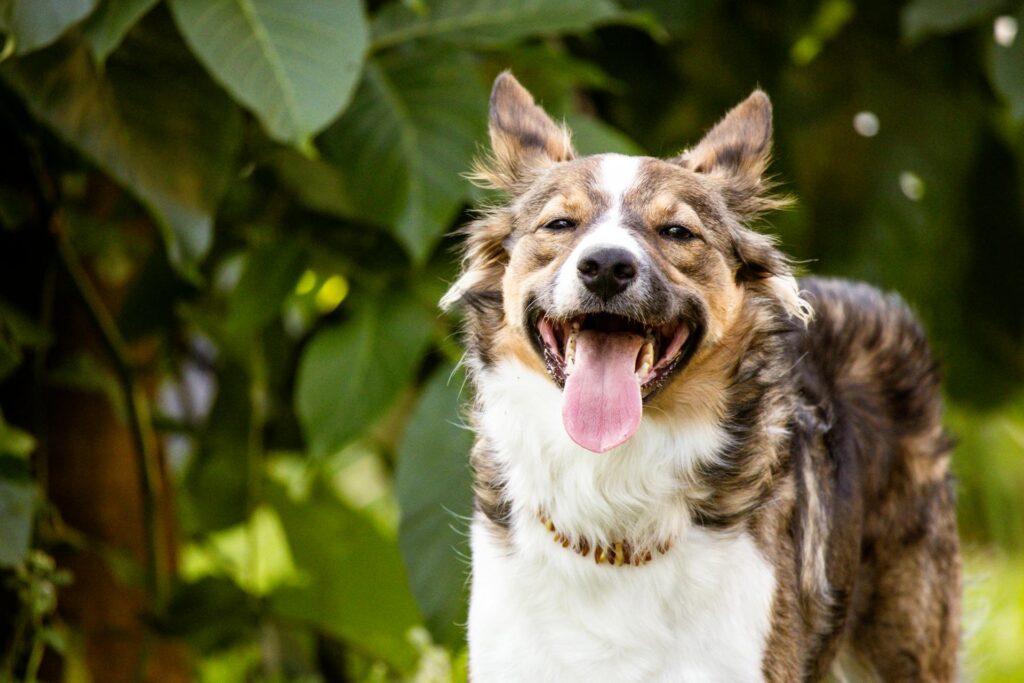
Has your pup suddenly turned into a panting machine? You might be wondering, “Why is my dog panting so much? Should I be worried?” Panting is a natural way for dogs to regulate their body temperature, but excessive panting can sometimes indicate an underlying issue. As a dog owner, paying attention to your furry friend’s behavior and well-being is important. This comprehensive article will help you understand the various reasons why your dog might be panting heavily and when it’s time to seek veterinary attention.
Normal Panting vs. Excessive Panting
Dogs don’t sweat like humans do. Panting is their primary way to cool down after exercise, playing fetch, or on a hot day. Panting refers to breathing with short, quick breaths, or being out of breath. It can either be normal (natural) or excessive panting.
|
Normal Panting |
Excessive Panting |
| Normal panting involves short, shallow breaths with the tongue lolling out slightly. The panting should subside once your dog rests or cools down. | It is a rapid, open-mouthed breathing with a tongue hanging out significantly. Other signs like drooling, glazed eyes, lethargy, or weakness might accompany it. |
Also Read: Why Does My Dog Pant When I Pet Him? 10 Common Reasons
Why Is My Dog Panting So Much?
If your dog exhibits excessive panting, especially when they’re not hot or haven’t been exercising, it’s important to identify the cause and seek veterinary care if needed. Here are some of the most common reasons why your dog might be panting excessively:
- Heatstroke – It is a serious medical emergency that can be fatal if not treated promptly. Symptoms include excessive panting, glazed eyes, excessive drooling, vomiting, diarrhea, and a high body temperature (over 103°F). If you suspect your dog is suffering from heatstroke, move them to a cool, shaded area immediately. Offer cool water to drink (not too much at once) and wet down their fur with cool water (avoid using ice water). Seek immediate veterinary attention.
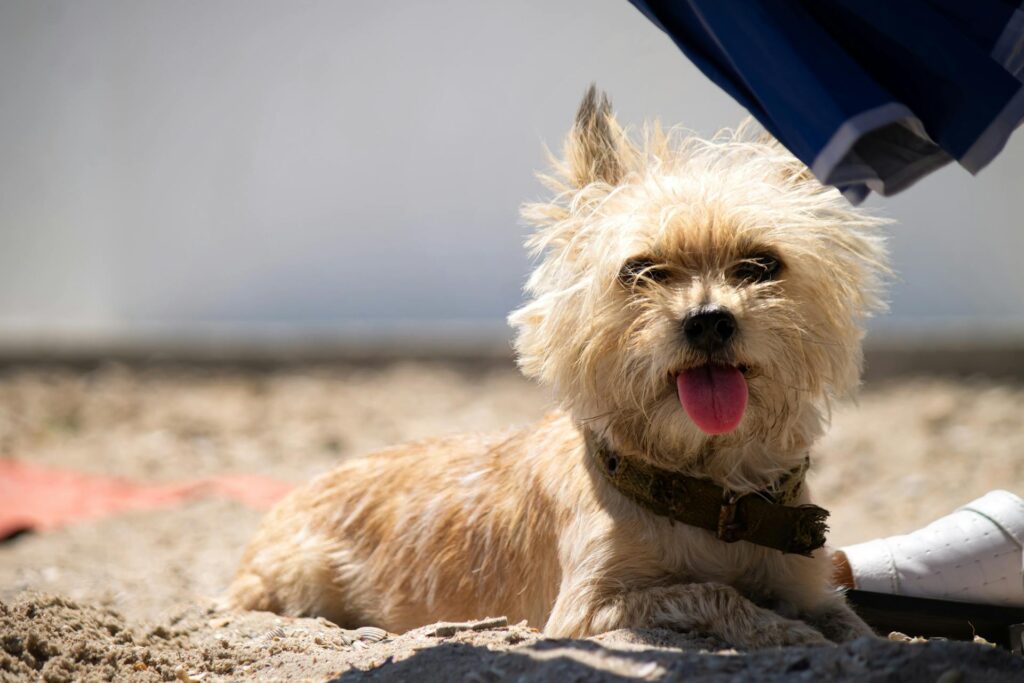
- Exertion – Panting heavily after a long walk, playtime, or exercise is normal. However, if your dog seems to be panting excessively even after moderate activity, it could indicate underlying health issues or poor conditioning. Consult your veterinarian if you’re concerned.
- Stress or Anxiety – Dogs can pant due to stress or anxiety caused by loud noises, separation anxiety, meeting new people or animals, or unfamiliar environments. Other signs of anxiety might include pacing, whining, licking, or trembling. Talk to your veterinarian or a certified animal behaviorist for ways to manage your dog’s anxiety.
- Pain or Discomfort – Pain from an injury, illness, arthritis, or other conditions can cause excessive panting in dogs. They might also exhibit signs like whimpering, licking the affected area, difficulty getting up or down, or losing appetite. If you suspect your dog is in pain, schedule a vet visit immediately.
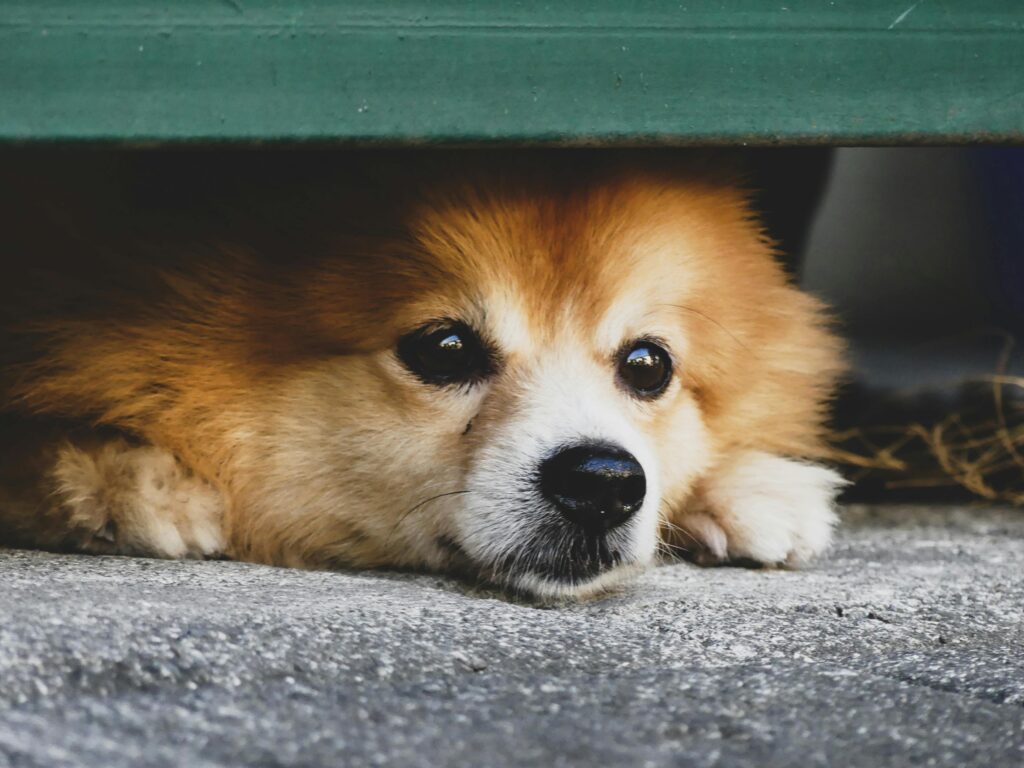
- Respiratory Problems – Conditions like allergies, kennel cough, bronchitis, or heart disease can make breathing difficult for dogs, leading to excessive panting. Other signs of respiratory problems might include coughing, sneezing, wheezing, or difficulty lying down. Seek veterinary attention promptly if you notice these symptoms in your dog.
- Dehydration – Ensure your dog has access to fresh, clean water at all times. Dehydration can lead to excessive panting, especially during hot days or exercise.
Also Read: Post-Grooming Behavior: Why Does My Dog Keep Sitting After Grooming?
What to Do if Your Dog is Panting Excessively?
If your dog is panting excessively, here are some steps to take:
- Move them to a cool, shaded area. If it’s hot outside, bring them indoors with air conditioning or use a fan.
- Offer cool water to drink. Don’t force them to drink, but provide fresh, cool water and let them drink at their own pace.
- Check for signs of heatstroke. If you suspect heatstroke, follow the emergency steps mentioned above and seek immediate veterinary care.
- Look for other concerning signs. Pay attention to any additional symptoms like lethargy, vomiting, diarrhea, or unusual behavior.
- Contact your veterinarian. Regardless of the cause, excessive panting can be a sign of an underlying issue. Schedule a vet visit to determine the root cause and get the appropriate treatment for your dog.
How To Prevent Excessive Panting?
Here are some tips to help prevent excessive panting in your dog:
- Provide plenty of fresh, clean water at all times.
- Avoid strenuous exercise during hot weather. Schedule walks and playtime for cooler times of the day.
- Never leave your dog in a hot car, even for a short time.
- Make sure your dog has access to shade and cool areas to rest in on hot days.
- Keep your dog groomed regularly, especially double-coated breeds. Brushing helps remove excess fur that can trap heat.
- Manage your dog’s weight. Overweight dogs are more prone to overheating and panting excessively. Maintaining a healthy weight through proper diet and exercise can help regulate their body temperature better.
- Consider cooling aids for hot days. Cooling vests, mats, and bandanas can help keep your dog cool during walks or outdoor activities.
- Manage stress and anxiety triggers. If your dog pants due to stress or anxiety, identify the triggers and work on desensitization techniques with a qualified animal behaviorist.
- Regular veterinary checkups are crucial. These checkups allow your veterinarian to identify any potential health issues that could be contributing to excessive panting, like respiratory problems or heart disease.
Additional Tips
- Breeds with Short Noses: Brachycephalic breeds like Pugs, Bulldogs, and Shih Tzus have shorter snouts and airways, making them more susceptible to breathing difficulties and panting, especially in hot weather. Be extra vigilant with these breeds and avoid strenuous activity on hot days.
- Traveling with your Dog: If you’re traveling with your dog by car or plane, make sure they have plenty of water and access to cool air. Never leave them unattended in a hot vehicle.
By understanding the reasons behind excessive panting in your dog and taking preventative measures, you can help keep your furry friend cool, comfortable, and healthy.
Understanding Excessive Panting: A Final Word
Excessive panting in dogs can be a scary experience for pet owners. However, by understanding the various causes and taking the appropriate steps, you can ensure your dog’s well-being. Remember, the key is to be observant and proactive.
If your dog is panting excessively, consider the following:
- The environment: Is it hot outside? Have they been exercising strenuously?
- Their behavior: Are they anxious, stressed, or in pain?
- Other symptoms: Do they exhibit any additional signs like vomiting, diarrhea, or coughing?
Based on your observations, you can take action:
- For mild cases – Move your dog to a cool, shaded area, offer water, and monitor their breathing.
- For suspected heatstroke – Follow emergency steps and seek immediate veterinary attention.
- For any concerns – Schedule a vet visit to determine the underlying cause and get the appropriate treatment for your dog.
By being a responsible pet owner and taking these steps, you can help your dog stay cool, comfortable, and pant-free! Remember, a happy and healthy dog is a dog who can breathe easy.
Why Is My Dog Panting So Much? – FAQ
While lagging behind on walks might be a topic of curiosity, sometimes excessive panting can be a cause for concern. Here are some frequently asked questions about dog panting to help you understand what might be going on:
Q.1. How much panting is normal?
A healthy dog at rest will typically breathe between 10-30 breaths per minute. However, this can vary depending on the breed, size, and age of your dog. If your dog is panting excessively, especially when they’re not hot or haven’t been exercising, then it’s best to consult your veterinarian.
Q.2. How can I tell if my dog’s panting is due to something serious?
Here are some signs to watch out for that might indicate a more serious underlying condition:
- Panting that is accompanied by other symptoms like vomiting, diarrhea, lethargy, or weakness.
- Panting that is rapid, shallow, or labored breathing.
- Panting at rest, especially when it’s not hot or after exercise.
- Pale gums or tongue.
- Difficulty breathing.
Q.3. Are there certain breeds of dogs more prone to panting?
Yes, some breeds with short snouts, like pugs, bulldogs, and Shih Tzus, have a harder time breathing and may pant more frequently than other breeds.
Q.4. Should I be worried if my dog pants after barking a lot?
Barking is a form of exercise, and it’s natural for your dog to pant a bit afterwards, especially if they’re getting excited. However, if the panting is excessive or accompanied by other concerning signs, consult your veterinarian.
Q.5. My dog pants at night. Should I be concerned?
Occasional panting at night might not be a cause for concern. However, if your dog is panting excessively at night and seems restless, it could be a sign of anxiety, pain, or a respiratory issue. Consult your veterinarian to rule out any underlying health problems.
Q.6. How can I calm my dog down if they’re panting due to anxiety?
If your dog seems anxious and panting excessively, try to remove them from the stressful situation. Provide a quiet, safe space for them to relax. Techniques like desensitization and counterconditioning can help your dog feel more comfortable in anxiety-provoking situations [░https://fearfreepets.com/prevention-and-management/]([invalid URL removed]
Q.7. My dog pants after eating. Is this normal?
For some dogs, especially brachycephalic breeds with short snouts, panting after eating can be normal. The act of chewing and swallowing can be more work for them, leading to some post-meal panting. However, if the panting is excessive or accompanied by difficulty swallowing, drooling, or regurgitating food, consult your veterinarian.
Q.8. Can certain medications cause my dog to pant more?
Yes, some medications can have panting as a side effect. If you notice your dog panting more after starting a new medication, consult your veterinarian. They might be able to adjust the dosage or prescribe a different medication.
Q.9. My dog is old and seems to pant more easily. Should I be worried?
As dogs age, their bodies become less efficient at regulating temperature. They might also develop underlying health conditions that can lead to panting. If you notice your senior dog panting more than usual, consult your veterinarian for a checkup.
Q.10. When should I take my dog to the vet for panting?
If your dog’s panting is accompanied by any of the following symptoms, err on the side of caution and take them to the veterinarian right away:
- Vomiting or diarrhea
- Lethargy or weakness
- Loss of appetite
- Pale gums or tongue
- Difficulty breathing
- Fever
- Seizures
Remember, it’s always better to be safe than sorry. If you’re concerned about your dog’s panting, consult your veterinarian for a proper diagnosis and treatment plan.
